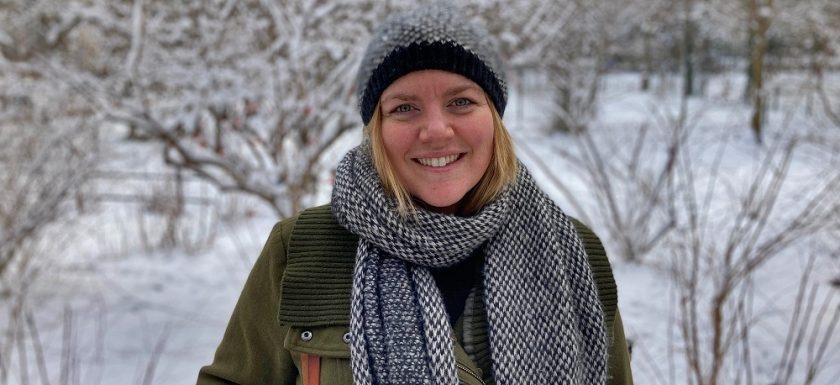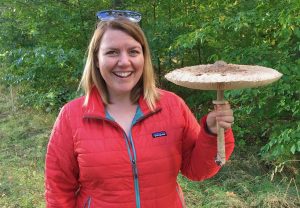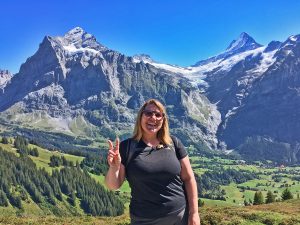
A native of Portland (Oregon), Katherine Mazzio received her PhD in a dual degree program in Materials Science and Engineering and Nanotechnology at the University of Washington in 2014. For her, obtaining a PhD is a critical training step to becoming a scientist. Right now, she supervises two PhD students, a master student and helps out whenever it is needed in her group.
Let us know a little bit more about your background from the USA to HZB in Berlin:
When I was in graduate school, I went to New Zealand for a short research stay and I loved it. After finishing my PhD at the University in Washington, I was looking for a postdoc abroad. My hope: moving to Australia due to its proximity to New Zealand. Unfortunately, at that time the scientific funding was problematic in Australia, so my husband and I started considering other opportunities abroad.
This is when you found out about a postdoc position at HZB in Berlin?

Exactly, I saw an ad for a position at HZB, I applied, and ended up moving to Berlin for the position. It was my first time in mainland Europe and my first time working at a synchrotron – very exciting!
I did a postdoc with Simone Raoux at the Institute for Nanospectroscopy at HZB. Since July 2020 I have been working in a joint research group between Humboldt University and HZB with Philipp Adelhelm, where the focus is on Operando Battery Analysis.
Thinking back of your own PhD, what are your first thoughts?
I remember being perhaps overly self-confident, you know the kind of “I know everything” young scientist.
In the States, when you are applying for PhD positions and you are accepted they will fly you out for a campus visit. At the University of Washington (UW) I really had my mind set that I wanted to work with a very specific professor, Christine Luscombe. During the interview, she told me that she did not have funds to support a new PhD student at the time, but somehow, she managed. Of course, now I understand that I could have found success with other professors in the department. But I really learned so much from Christine and am fortunate that she found a way to support me in the end.
What does it mean for you doing a PhD?
First, I need to mention that there are differences between the PhD programs here at HZB and many of those in the USA. From my experience at HZB, I find the PhD period to be very short. I think it is difficult for the students to get everything done in only three years.
One of the main differences is that often in the US one will enter into a PhD position directly after receiving a bachelor’s degree instead of getting a separate master’s degree first. In my case, my master’s program was wrapped up in the PhD program, so all in all it took five years.
I think that it can take a longer time to train to become a scientist, because you really need to be able to demonstrate the ability to be an independent researcher. And this doesn’t happen overnight.
How do you envisage your role as PhD supervisor?
Supervising is not an activity I see as an extra task. The responsibility of supervising graduate students is indeed part of my job and I very much enjoy this role. Every student is different. With that come new challenges and you must adapt to deal with the things that are happening in both their personal and professional lives. Supervising a student is always a new story, and some students require more oversight than others. Becoming a scientist requires more than just learning new analysis techniques and interpreting data, which are of course very important.
So, how does one become a scientist?
To become a scientist, you have to focus more on developing the soft skills that go along with these harder skills. This means learning how to develop ideas, write scientifically, convey your message to different audiences, network, and find the resources that are required to bring your ideas to fruition. These are also some of the key selling points that many future employers are looking for. They probably won’t care that you have performed a million angular resolved photoemission spectroscopy experiments. However, they might be interested in your critical thinking skills, or your ability to handle large datasets, work in a team, and communicate results effectively.
Some of the core things I work with PhD students on in my current group are writing manuscripts and proposals for beamtime. We work also on their oral presentation skills. I am acting as a liaison between HZB and HU and am keeping the students updated on opportunities to expand their knowledge through programs like the upcoming photon school or Rietveld analysis school.
You mention also that you supervise master’s students, how is it different to the PhD students?
I believe with master’s students there is more a feeling of direct supervision, where we are doing science together as a team. It requires more scheduling and making sure that we are on top of deliverables since there is such a short and well-defined timeline. We have regular brainstorming sessions and share interesting literature much more regularly than I do with PhD students.
I try to get all students involved in shaping their own projects, regardless of their level of education. I think it’s hard to put forth continuous effort into projects when you aren’t invested at a very fundamental level. Teamwork makes the dream work!
Any challenge you are thinking of in supervising PhD students?
The main challenge I see with PhD student supervision at HZB is that there does not seem to be much cohesiveness across the institution. There is not always the same understanding of what supervision entails in each department. This has the consequence of leaving some students behind and has potential knock-on effects related to the long-term reputation of HZB.

When you are not doing research or supervising students, what do you like doing?
I am a member of the Early Career Professionals subcommittee of the MRS (Materials Research Society) and help develop some of their broader impacts programming.
Not science related, I have a passion for travelling, hiking and camping. I have really enjoyed the opportunity to explore all over Europe since moving to Berlin. Because of the pandemic, the adventuring has slowed down significantly. However, we can still travel further afield through our cooking. We have spent a lot of time working on our Sichuan, Mexican, and Levantine cuisine, among many others!
Thank you for this interview Katherine.
Materials Research Society
The goal of the Materials Research Society is to build a dynamic, interactive, global community of materials researchers to advance technical excellence by providing a framework in which the materials disciplines can convene, collaborate, integrate and advocate.
Learn more > https://www.mrs.org/
Did you like this interview? You may enjoy also reading other interviews in the series #phdlife: science.hzbblog.de/tag/phdlife
